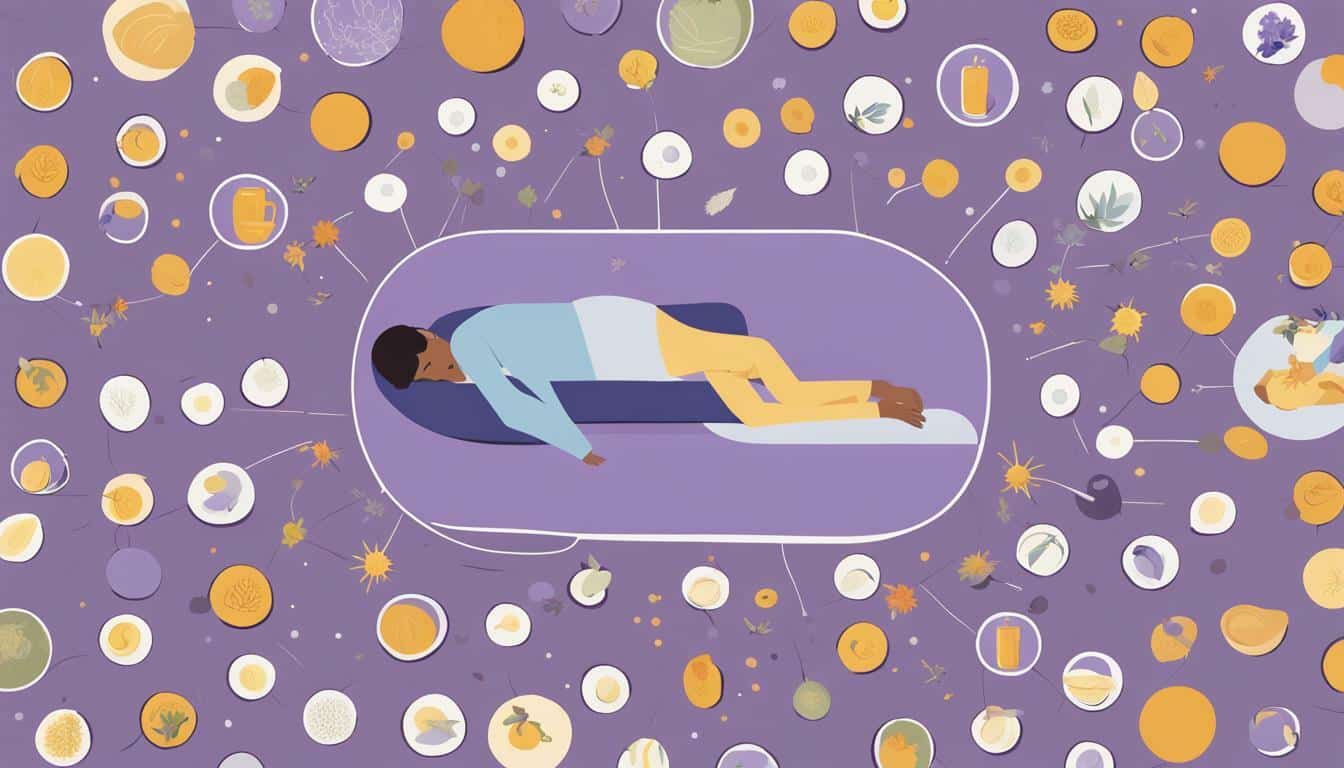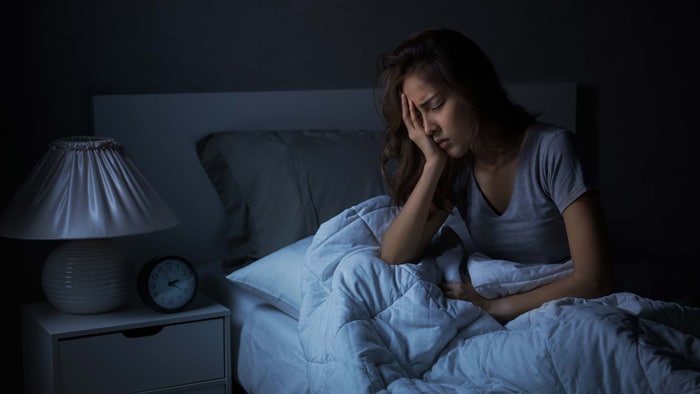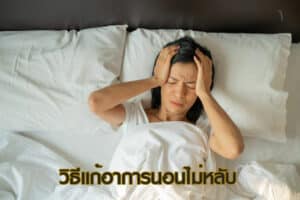
Good quality sleep is essential for overall health and well-being. However, many individuals struggle with sleep maintenance insomnia, a type of insomnia where one faces difficulty staying asleep. Sleep maintenance insomnia can have a significant impact on an individual’s daily functioning, causing sleep troubles, disrupted sleep, and sleep fragmentation. In this article, we will explore the causes and potential solutions for sleep maintenance insomnia, and highlight the importance of addressing sleep disturbances for optimal health.
Key Takeaways:
- Sleep maintenance insomnia is a type of insomnia where an individual has difficulty staying asleep.
- Symptoms of sleep maintenance insomnia include disrupted sleep, sleep fragmentation, and sleep troubles.
- Sleep deprivation can have a significant impact on daily functioning and overall health.
Causes of Sleep Maintenance Insomnia
Sleep maintenance insomnia is a common sleep disorder characterized by difficulty staying asleep. It can be caused by a variety of factors, both physical and psychological, that disrupt sleep patterns and prevent individuals from achieving restful sleep. Below are the most common causes of sleep maintenance insomnia:
Underlying Sleep Disorders
Some individuals with sleep maintenance insomnia may have an underlying sleep disorder that disrupts their sleep patterns. Sleep apnea, which causes brief interruptions in breathing during sleep, can lead to fragmented sleep and frequent awakenings. Restless legs syndrome, a condition that causes uncomfortable sensations in the legs and an urge to move them, can also interfere with sleep. Treating underlying sleep disorders is essential in managing sleep maintenance insomnia.
Lifestyle Factors
Lifestyle factors can also contribute to sleep maintenance insomnia. Stress, anxiety, and poor sleep hygiene, such as irregular sleep schedules or excessive caffeine intake, can disrupt sleep patterns and lead to frequent awakenings. Addressing lifestyle factors can help improve sleep quality.
Disruptions in Circadian Rhythm
The circadian rhythm, which regulates the sleep-wake cycle, can also be disrupted in individuals with sleep maintenance insomnia. Shift work or jet lag can alter the body’s natural sleep patterns and lead to difficulty staying asleep. Consistency in sleep schedules can help regulate the circadian rhythm and improve sleep quality.
Medical Conditions and Medications
Some medical conditions and medications can also interfere with sleep patterns and contribute to sleep maintenance insomnia. Chronic pain, asthma, and allergies can make it difficult to fall and stay asleep. Certain medications, such as those used to treat high blood pressure or depression, can also cause sleep disturbances. Consulting with a healthcare provider can help identify and address medical conditions and medication-related sleep troubles.

Symptoms of Sleep Maintenance Insomnia
If you experience difficulty staying asleep, you may be suffering from sleep maintenance insomnia. Common symptoms of this condition include disrupted sleep, frequent awakenings, and poor sleep quality. Individuals with sleep maintenance insomnia may find themselves waking up in the night and struggling to fall back asleep, leading to sleep deprivation and daytime drowsiness.
Insomnia symptoms can have a significant impact on daily functioning and overall well-being. The quality of sleep affects our ability to think clearly, regulate our emotions, and interact with others. If left untreated, insomnia can lead to a range of health problems, including depression, anxiety, and chronic pain.
Effects of Sleep Maintenance Insomnia
Sleep maintenance insomnia can have significant short and long-term effects on a person’s overall health and well-being. The disrupted sleep patterns can lead to sleep deprivation, which can, in turn, cause fatigue, irritability, and difficulty concentrating during the day.
In the long term, sleep maintenance insomnia may increase the risk of developing chronic health conditions such as obesity, diabetes, and cardiovascular disease. Sleep deprivation also weakens the immune system, making individuals more susceptible to illness and infection.
Furthermore, sleep maintenance insomnia can have a significant impact on cognitive function, including memory, attention, and decision-making abilities. It can also affect mood regulation, leading to decreased emotional control and increased risk of developing anxiety and depression.
Individuals with sleep maintenance insomnia may also be at increased risk of developing other sleep disorders, such as sleep apnea, restless legs syndrome, and narcolepsy.
Tips for Managing Sleep Maintenance Insomnia
Managing sleep maintenance insomnia can be challenging, but it is possible to improve sleep quality with some lifestyle changes and techniques.
Establish a Consistent Sleep Routine
Going to bed and waking up at the same time every day can help regulate your body’s sleep-wake cycle. Avoiding naps during the day, especially in the late afternoon or evening, can also help. Stick to a routine even on weekends and holidays to maintain a regular sleep pattern.
Create a Conducive Sleep Environment
Your sleeping environment can impact your sleep quality. Make sure your bedroom is a comfortable and peaceful space. Keep the temperature cool and dark, invest in comfortable pillows and mattresses, and minimize noise and distractions.
Practice Relaxation Techniques
Relaxation techniques like yoga, meditation, or deep breathing exercises can help reduce stress and calm your mind before bed. A warm bath or reading a book can also help you unwind and prepare for a good night’s sleep.
Consider Cognitive-Behavioral Therapy for Insomnia (CBT-I)
CBT-I is a form of therapy that focuses on identifying and changing negative thought patterns and behaviors related to sleep. It can be effective in treating sleep maintenance insomnia, especially when combined with other strategies like establishing a sleep routine and creating a conducive sleep environment.
By following these tips, you can improve your sleep quality and reduce sleep troubles associated with sleep maintenance insomnia.
Seeking Professional Help for Sleep Maintenance Insomnia
While implementing lifestyle changes can be effective in managing sleep maintenance insomnia, individuals experiencing persistent sleep troubles should consider seeking professional help. Sleep maintenance insomnia can be caused by underlying sleep disorders, such as sleep apnea or restless legs syndrome, that require medical treatment.
Consulting a healthcare provider can also help identify any medication or health conditions that may be affecting sleep quality. Sleep specialists can further evaluate sleep patterns and recommend alternative therapies, like cognitive-behavioral therapy for insomnia (CBT-I), to address sleep fragmentation and improve overall sleep quality.
Ignoring persistent sleep troubles can lead to long-term consequences, such as chronic sleep deprivation, increased risk of developing other sleep disorders, and even chronic health conditions. Don’t hesitate to seek professional help for sleep maintenance insomnia and prioritize getting the restorative sleep your body needs.
Tips for Managing Sleep Maintenance Insomnia
If you suffer from sleep maintenance insomnia, there are practical solutions you can implement to improve your sleep quality. Below are some tips to help you manage sleep troubles and reduce disrupted sleep:
Establish a Consistent Sleep Routine
Set a regular bedtime and wake-up time, even on weekends. Your body will adjust to this routine, making it easier to fall asleep and stay asleep.
Create a Conducive Sleep Environment
Make sure your bedroom is quiet, cool, and dark. Use comfortable sheets and pillows and remove any distractions, such as electronic devices. Consider investing in a white noise machine or earplugs if you’re sensitive to noise.
Practice Relaxation Techniques
Before bed, try relaxation techniques such as deep breathing, meditation, or yoga. These techniques can help reduce stress and promote relaxation, making it easier to fall asleep.
Consider Cognitive-Behavioral Therapy for Insomnia (CBT-I)
CBT-I is a form of therapy designed to help individuals with insomnia. It involves changing negative thoughts and behaviors that contribute to sleep problems. This therapy can be effective in improving sleep quality and reducing sleep disturbances.
While managing sleep maintenance insomnia can be challenging, implementing these tips can help reduce disrupted sleep and improve sleep quality. If sleep troubles persist, seek professional help from a sleep specialist or healthcare provider to explore additional treatment options.
Take Care of Yourself
Remember to prioritize self-care and engage in healthy habits, such as regular exercise, a balanced diet, and stress management. These practices can help reduce sleep deprivation and improve overall health and well-being.
Conclusion
Sleep maintenance insomnia can significantly impact daily functioning and overall health. By establishing a consistent sleep routine, creating a conducive sleep environment, practicing relaxation techniques, considering CBT-I, and seeking professional help if needed, individuals can reduce sleep troubles and improve sleep quality. Prioritizing self-care and healthy habits can also promote better sleep and overall well-being. Don’t let sleep deprivation disrupt your life – take action to manage sleep troubles and improve your sleep quality!
FAQ
Q: What is sleep maintenance insomnia?
A: Sleep maintenance insomnia refers to the difficulty individuals face in staying asleep throughout the night. It is characterized by frequent awakenings and can result in disrupted sleep and poor sleep quality.
Q: What are the causes of sleep maintenance insomnia?
A: Sleep maintenance insomnia can be caused by various factors. Underlying sleep disorders, such as sleep apnea or restless legs syndrome, can contribute to this condition. Additionally, lifestyle factors like stress, anxiety, and poor sleep hygiene can disrupt sleep patterns.
Q: What are the symptoms of sleep maintenance insomnia?
A: Common symptoms of sleep maintenance insomnia include frequent awakenings during the night, difficulty falling back asleep after waking up, and poor overall sleep quality. Sleep deprivation and its impact on daily functioning are also commonly experienced.
Q: What are the effects of sleep maintenance insomnia?
A: Sleep maintenance insomnia can have both short-term and long-term consequences. It can affect cognitive function, mood regulation, and physical health. There is also an increased risk of developing other sleep disorders and chronic health conditions.
Q: How can sleep maintenance insomnia be managed?
A: There are several tips for managing sleep maintenance insomnia. Establishing a consistent sleep routine, creating a conducive sleep environment, and practicing relaxation techniques can be helpful. Cognitive-behavioral therapy for insomnia (CBT-I) may also provide benefits.
Q: When should I seek professional help for sleep maintenance insomnia?
A: It is important to seek professional help if sleep maintenance insomnia persists. Sleep specialists can provide guidance and treatment options, such as medication or alternative therapies. Consulting a healthcare provider is recommended if sleep troubles continue.

